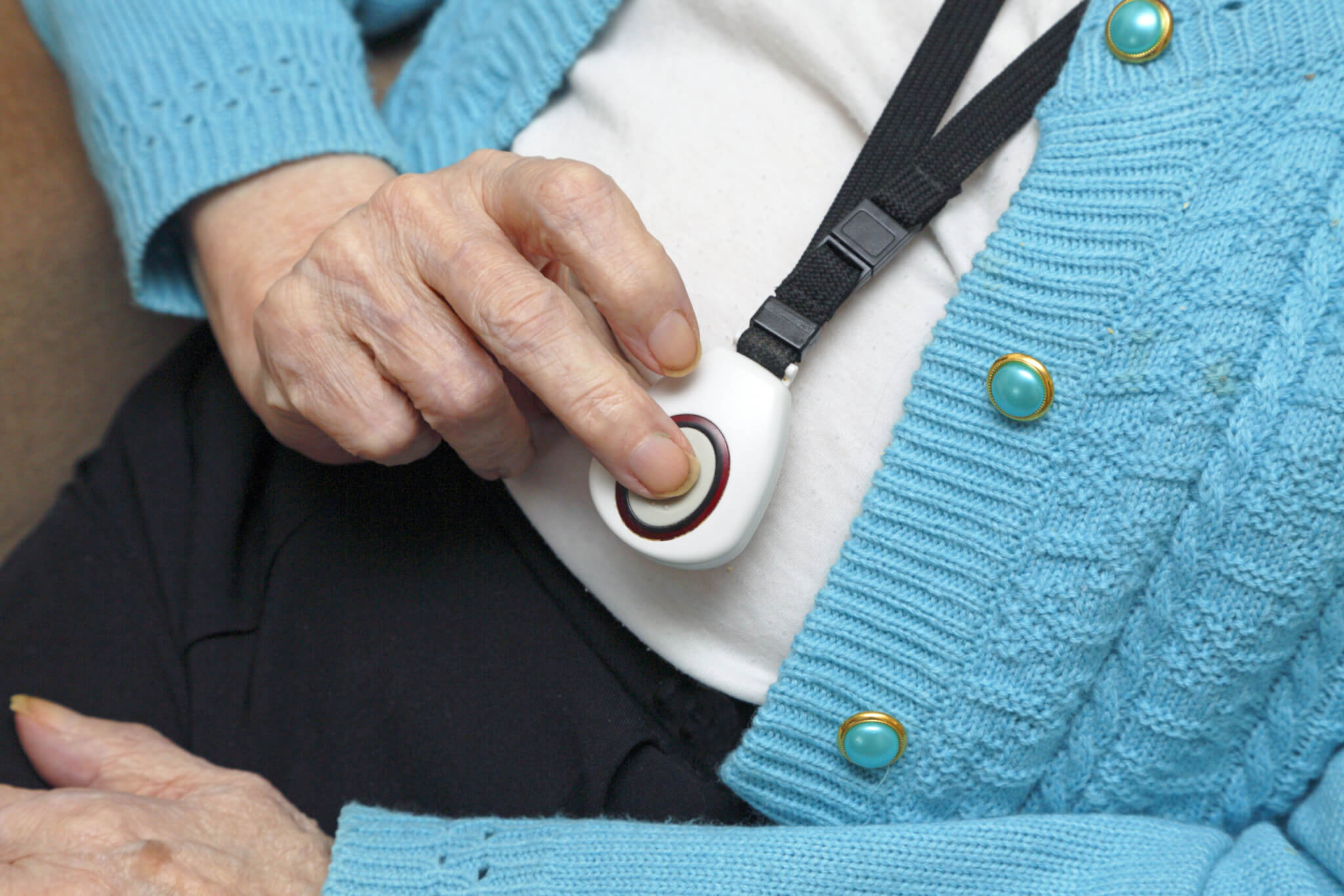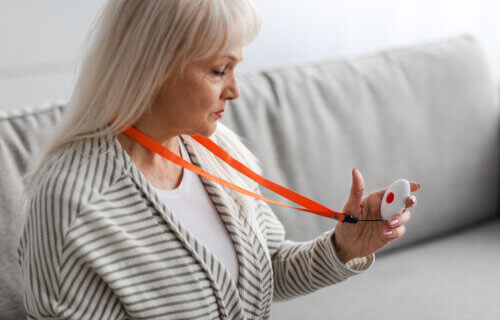If you’re a senior living alone, it might be time to start thinking about a medical alert system. These monitoring systems will always be available to use in case of emergency, reaching out to medical professionals in an instant. There are many programs to choose from, but which are right for you? StudyFinds has compiled a list of the best medical alert systems every senior should have to monitor their safety.
Falling is a major issue for the elderly across the country, and it is one of the main concerns that lead seniors to seek out a medical alert system. A recent study finds that falls could potentially be caused by the medication they’re taking. Researchers from the University of Buffalo report that nearly every older American over 65 years old (94%) was prescribed at least one drug that raised their risk of falling in 2017. That being said, it isn’t as easy as opting out of one of your essential medications, so having extra security at home is a game changer.
Another unpleasant matter to deal with when one gets older is the possibility of living in an assisted-living facility. A recent survey reveals 70 percent of Americans says it’s uncomfortable to think about needing to live in a nursing home. More than four in 10 Americans believe nursing homes are unsafe, leading 61 percent to also feel uneasy about admitting their loved ones into assisted living facilities. Luckily, investing in a top-notch medical alert system in your home allows seniors to live alone with added protection.
Are you in the market for a stress-free senior living situation? After scouring online experts, StudyFinds has put together a list of the top five best medical alert systems for seniors. Is there one we missed? Let us know in the comments below!

The List: Best Medical Alert Systems, According to Experts
1. Bay Alarm Medical
Topping the list for best medical alert systems is Bay Alarm Medical. “With pricing plans that fit any budget and over 70 years of proven life-saving dispatches, Bay Alarm Medical is a premiere medical alert provider that you can trust and rely on,” writes Medical Alert Buyer’s Guide.
“Its SOS Smartwatch alert device stands out for its subtlety. For those who may feel self-conscious about wearing a pendant or bracelet that clearly looks like a medical alert, this option may be preferable,” notes U.S. News & World Report. “It looks just like a regular wristwatch but comes equipped with an SOS button on its side and GPS tracking.”
The National Council on Aging calls Bay Alarm Medical the best quality for price. “While most on-the-go systems have starting monthly costs between $35–$40, the on-the-go systems from Bay Alarm Medical start at $29.95–$39.95 (monthly costs increase based on the system you choose). Its at-home system starts at $25 monthly, which is at the lower end of the price range for in-home systems.”
2. MobileHelp
Forbes calls MobileHelp the best caregiver app. “The MobileHelp Duo offers a substantial signal range, maximizing protection and safety throughout the user’s home. It also boasts a 30-day money-back guarantee, free ground shipping (for most plans), free activation and a free lockbox (for purchases over $29.95) with every order. Plus, MobileHelp requires no long-term contracts and provides access to the MobileHelp Connect app for users and caregivers to receive system status alerts, non-emergency and emergency alerts and use the ‘locate the mobile device’ feature. MobileHelp’s U.S.-based emergency response operators are certified by the Security Industry Association.”
“Consider MobileHelp if you want a simple, low-maintenance system. All packages come with professional monitoring services, two-way voice communication and waterproof equipment. The battery on the pendant or wrist button can last more than five years,” writes Consumer Affairs.
The Senior List says MobileHelp is one of the most affordable systems. “Recently, MobileHelp introduced the MobileHelp Touch Classic, a unique tablet medical alert system. Instead of a traditional base station, this system features a tablet with a touch screen. It allows you to use activity tracking, medication reminders, and even play Sudoku, in addition to the traditional emergency features.”
3. Medical Alert
SafeWise calls Medical Alert best for fall detection. “Medical Alert’s Mobile System uses more fall detection sensors than most other systems: an accelerometer, gyroscope, and barometric pressure sensor. Its basic in-home system has the lowest starting rate we’ve seen (if you can afford an annual upfront payment of at least $240), and we found Medical Alert’s representatives to be the most knowledgeable, which goes a long way whether you’re shopping around or calling for help.”
“Medical Alert delivers trustworthy and dependable 24/7 medical monitoring,” says Medical Alert Buyer’s Guide. “Get a free month and free shipping when you sign up for an annual plan.”
Medical Alert has an in-home range of 800 feet. “Medical Alert’s Home System has both landline and cellular options and starts at $22.95 per month plus a one-time programming fee of $49 for the landline option,” writes U.S. News & World Report. “Plans come with access to the Medical Alert Connect mobile app and a button pendant or bracelet. The Mobile System starts at $42.95 per month plus a one-time programming fee of $49. Fall detection can be added to any system for an additional $10 per month.”

4. Medical Guardian
The National Council on Aging names Medical Guardian as its top pick. “Very few other medical alert companies offer so many extras to tailor your system to your specific needs. This may be why a majority (43%) of our survey respondents use Medical Guardian for their medical alert system.”
“Medical Guardian has lots of equipment options, a straightforward purchase process and 24/7 professional monitoring. On-the-go systems come with GPS location tracking, which helps older adults stay independent and reassures family members that — if something goes wrong — help is on the way at the touch of a button,” writes ConsumerAffairs. “Check out the Mini Guardian (starting at $44.95 per month) if you want a lightweight device with a good battery; it lasts up to five days. The newer smartwatch design, MGMove, has some unique features, but the battery only lasts up to 24 hours, so you have to charge it daily.”
The Senior List calls Medical Guardian the best GPS medical alert. “In terms of devices, Medical Guardian offers an in-home traditional medical alert system, an in-home cellular option, and three mobile devices, including an all-in-one mobile unit, the Mini Guardian, and their MGMove smartwatch. Both the Mini and the mobile unit feature GPS technology and optional fall detection. What’s more, their systems are both intuitive and simple to use. I was able to get mine up and running in a matter of minutes.”
5. ADT
Rounding out the top five medical alert systems is ADT. “ADT is a recognized brand with a long tradition of protecting families all across the country,” says Medical Alert Buyer’s Guide. “Their call centers are top notch and have excellent, trained representatives.”
“For those who mostly stay close to home, the landline-based Medical Alert Basic system comes with a pendant featuring a 300-foot range and is $29.99 per month,” notes U.S. News & World Report. “For $35.95 per month, the Medical Alert Plus system extends the range to 600 feet and does not require a landline. For those seeking a mobile option, the On-The-Go system for $39.99 per month can track location with GPS and can be carried or worn as a pendant.”
The National Council on Aging calls ADT the best for no extra fees. “While your options are somewhat limited with ADT Health, the three medical alert devices from the company are simple and straightforward. Fees for at-home systems start at $29.99 per month—similar to competitors—and there are no hidden costs or extra fees. This means no activation fees, shipping fees, and processing fees if you decide to return the system. ADT even sends a prepaid shipping label for returns.”
You might also be interested in:
- Best Retirement Communities in The U.S.
- Best Places to Retire in America
- Best Jobs for Seniors
- Best Cat Breeds for Seniors
Sources:
- Medical Alert Buyer’s Guide
- Top5 Medical Alert Systems
- Consumers Advocate
- U.S. News & World Report
- The National Council on Aging
- Forbes
- ConsumerAffairs
- The Senior List
- PC Magazine
- SafeWise
Note: This article was not paid for nor sponsored. StudyFinds is not connected to nor partnered with any of the brands mentioned and receives no compensation for its recommendations. This post may contain affiliate links.
All prices quoted in this article are correct at the time of publishing but are subject to change.

If you have never had a cat before do not get a Maine coon. They are more complicated than you think and are not that easy to raise unless you know what you are doing. Yes, they are wonderful companions! However, you should be familiar with cats before getting a Maine coon. C. L. K